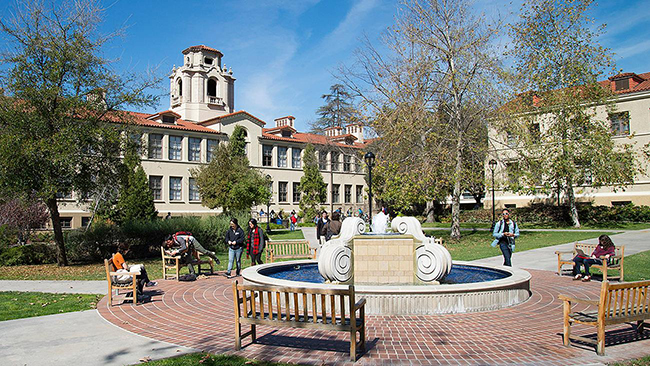Council approves 2020-21 budget, $1.9 million in cuts
by Kathryn Dunn | editor@claremont-courier.com
The Claremont City Council unanimously approved the 2020-21 budget last Tuesday, which resulted in cuts to projected spending, particularly within the human services department, while also approving implementation of an increased salary survey for all employees for a cost of $570,500.
“We successfully found $1.9 million in cuts,” city manager Tara Schultz wrote in her staff report to council. “These cuts were not easy recommendations to make due to the impacts that they will have, not only on city programs, but also on the community organizations that we work closely with to provide the services the city cannot.”
The 2020-21 budget outlines $49.4 million in total revenues and $48.9 million in total expenditures, with general fund revenues and expenses at $26.7 million and $25.2 million, respectively.
The city said it began the 2020-21 budget process facing a structural deficit of about $800,000, which staff expected to grow to $2.8 million in 2023-24.
“The failure of Measure CR, the city’s sales tax measure that would have provided an additional $2.5 million in general fund revenue annually, has left the city without additional resources to help us maintain more than our core services.” Ms. Schultz related to the council.
A first pass at cutting services and supplies, eliminating positions and deferring an additional payment toward the city’s PERS unfunded liability realized a savings of $911,000, the city said. Included in those cuts were withdrawing financial support to community based organizations and nonprofits like the Claremont Homeless Advocacy Program, Sustainable Claremont and AgingNext.
Property tax revenue is expected to increase 4.5 percent, as it has over the past several years, the city reported, bringing in about $10.7 million to the general fund next year. Utility franchise taxes will also rise by 4.5 percent, primarily due to increased fees related to cable television, the city said. Losses are expected in utility user taxes and, most significantly, sales taxes.
“The cushion will be eaten up largely by sales tax losses from the COVID-19 pandemic,” the city manager said in her report.
Sales tax were initially expected to decline 13.2 percent or by $638,000 more than what was budgeted for last year, leaving the city with an estimated $4.2 million in sales tax revenue. Additional losses from COVID-19, include a drop in hotel tax revenue anticipated to be about $1.2 million this year with another $1 million in the 2020-21 budget, according to the city.
In the 2018-2019 budget, the city had a total of 159 “funded” or full-time positions, which will drop to 154 in 2020-21. Positions in the city manager’s office, police department, administrative services and finance departments at city hall, as well as the sanitation department are essentially untouched.
The city manager’s office maintains 4.5 full-time employees, in addition to the city manager there is an administrative assistant, an executive assistant, an assistant to the city manager and the assistant city manager. Though staffing remains stable, costs from from last year are down 3.37 percent for a savings of $32,000.
In 2018, the city manager’s office logged 689 citizen contacts, but in 2019, that number rose to 862 people contacting the office. Agenda report reviews also spiked from 154 in 2018 to 230 reports in 2019.
Community development lost two positions in this year’s budget—one from engineering and one from building/community improvement. The department is down 3.85 percent from what was budgeted in 2019-2020; however, expenses that were proposed this year were more than $500,000 over what was actually spent the previous year.
Even with the eliminated positions, when comparing actual expenses in 2018-2019 to what was approved for next year, the community development department has increased expenditures by $376,144 in the last two years.
The most hard-felt cuts were from human services, which had three positions cut. Human services oversees youth, recreation and senior/social services for the city and lost two positions in the recreation program and one from seniors and social services.
The city has traditionally maintained a 25 percent reserve for general fund operating expenditures, but the reserve balance as of now sits at 19.5 percent or $5.2 million.
User fees increased
In September of 2018, the council approved a “Comprehensive User Fee Schedule,” which permits annual increases in fees charged by the city for different services to be implemented every July 1.
Last Tuesday night the council filed a .7 percent increase to fees in nearly all departments, except sanitation, because the charge for trash collection was previously raised by the council in a separate action. Also, fees for services performed by the planning division were not raised in cases where applicants must pay a deposit for projects.
Salary surveys increased
Several employee groups will see an increase in salary surveys—the salary ranges set by doing a comparison of pay scales for cities in the region.
Memorandums of Understanding with employee groups—Claremont Administrative and Technical Support Employees Association (CATSEA), Claremont Employees Association (CEA), Claremont Management Association (CMA), Claremont Police Management Association (CPMA), Claremont Police Officers Association (CPOA), and the Claremont Professional Employees Association (CPEA)—dictate that “salaries are to be adjusted to market average.”
The salary survey increase will cost $570,500 in 2020-21, which was included in this budget.
“Historically, these salary adjustments have occurred as part of the negotiation process and have been implemented with the success or agreements,” Ms. Schultz related in the staff report. “However, as the city is currently in negotiations with four of our six bargaining groups, it is necessary to implement the salary survey results prior to implementation of any success or agreements.”










0 Comments